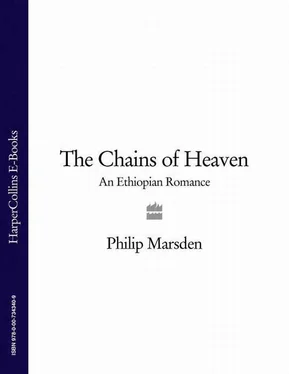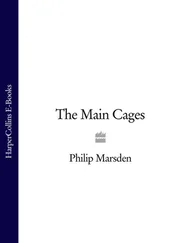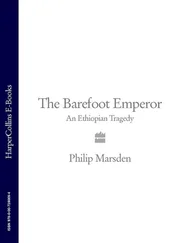Resettlement was the Derg’s chosen solution to the famine. Shift tens of thousands to the fertile prairies of the south and there would be no more hunger (and no more rebels). The family were separated. Hiluf and his father were flown to Addis Ababa in the hold of an Antonov. By bus they continued south. They were left in the forest. Local villagers brought them food. Every morning and every evening, Hiluf ‘s father would stand outside and pray to find his family. One day, Hiluf ‘s uncle came. He had been looking for them for months. He took them to his village, and there were Hiluf ‘s mother and all his brothers and sisters. ‘Oh—what a happy moment!’
For many years they lived in the south of Ethiopia.
‘But it wasn’t a good place,’ said Hiluf. ‘It was a very bad place they sent us to.’
It was the lowlands. To the Amhara and the Tigrayan highlanders nothing is as intrinsically bad as qola, the lowlands. It is the place of insects and diseases, big animals, dangerous Muslims and budas.
‘In the day the monkeys took the maize, at night the fox, porcupine, wild cat and wild pigs. We children became ill. A buda came to my sister and my brother. The buda was talking and shouting through them. They fell on the floor. They would have died but someone went into the forest and collected the right roots and ground them up and burned them. The budas screamed, they shouted—but the smoke drove them away.’
Those who were caught trying to return to the north were killed by the Derg. In 1991, Hiluf ‘s family heard that Mengistu had fled the country and the EPRDF were in power. They made their way back to Tigray. Their house was destroyed, but his father kissed the soil and soon they had built another.
‘All my brothers and sisters are still there, on the land,’ he said, with a hint of sadness.
‘How is it that you’re not a farmer, Hiluf?’
‘I was always too lazy to do farm work! I said I wanted to go to school instead. I liked to learn. I would always get more than 90 per cent. So I went to university.’
It was late. The moon had broken free of the ridge-line and was roaming the open country above. Bisrat and Makonnen were asleep, their heads propped on the packsaddles. The priests and monks were making their way down to church, a row of ghostly figures moving through the trees.
‘Shall we join them?’ asked Hiluf.
‘Let’s sleep.’ I rolled out my sleeping bag. I was exhausted. ‘We can go to the church in the morning.’
I’d been waiting for years to see the church of Yimrehanna Krestos. My hankering for the forbidden north of Ethiopia had been offset in part by frequent thumbing of Georg Gerster’s illustrated Churches in Rock. Gerster had travelled in the north during the last years of the emperor. It was largely his work that revealed Lalibela to the world. But for me his pictures of Yimrehanna Krestos were somehow more striking. Whereas Lalibela’s churches were a feat, dug out of the rock, King Yimrehanna Krestos had in the twelfth century built this edifice inside an existing natural feature. The juxtaposition was a stroke of genius. With its neat striped walls pinched between rough floor and rough ceiling, it spoke of man’s frailty in the natural world. But it was also faintly comic—a piece of confectionery popped into the cave-mouth.
At dawn, we stumbled down through the trees. Prayer hummed from the cave entrance. Straw covered the bare rock floor and one or two carpets lay over it. From under one of the carpets wriggled a priest.
‘You! You!’ he shouted. ‘Who are you? What do you want?’
‘We want to look at the church.’
His aggression dissolved as he woke. He yawned and picked the straw from his hair. Then he put on his turban. He led us into the treasury where the other priests and debtara sat dazed after the night’s worship. The church itself, a cave within a cave, was crusted with centuries of devotion. The walls were dark and tallow-stained. Its trussed wooden roof suggested an upturned boat and generations of hopeful souls sheltering beneath it. Geometric inlay covered much of the walls and ceilings. Set into it was a mysterious cast of heraldic beasts—peacocks, double-headed eagles, men with wings, men with scorpions, vulture-headed men and a large number of elephants.
Beside the church was the tomb of Yimrehanna Krestos himself, a dwarf cottage hung with drapes. Two women circled it with rocks on their shoulders. From time to time they would lean over, press their hands on the drapes and kiss them. They were muttering, as if purging some deep-held trauma. When I looked more closely one of their rocks turned out to be a baby.
The priest was also watching them. He was still picking pieces of straw from his beard. He had been earnest in the treasury, earnest in the church, and was very earnest here at the royal tomb. But at the back of the cave his mood lightened: ‘Look—dead people!’
The light of my torch lit up a sea of bodies. They stretched far back into the darkness. In places a thigh bone or forearm raised itself from waves of skeletons and tattered cloth. At my feet was a dug-out coffin and a body squeezed into it. There was skin still on the cheek.
‘The followers of Yimrehanna Krestos. They came from Jerusalem.’
There was a squeaking from the back of the cave and a stream of bats whistled out over our heads. I ducked. The priest ignored them.
With a grand sweep of his hand he took in the entire range of the bodies. ‘Five thousand seven hundred and forty! The king told them when they finished work, Go back to your own country. But they said, No, your majesty, we want to stay here. With you! Think of that—they could have lived out their days in the holy city, but they chose to stay here.’
Just as Ethiopians have idealised far-off Jerusalem, so their own isolation has created in their name a glorious gallery of mythical figures. The most potent of all emerged at about the time of Yimrehanna Krestos. It was then that news reached the rest of Christendom of a powerful ruler beyond the Islamic cordon. Originally he was believed to reign over both Asia and Ethiopia, but as Asia opened up and there was no sign of him, so Ethiopia became the only possible site for his kingdom. Prester John changed the shape of the known world and haunted the European imagination for centuries to come.
Around the year 1165 a letter was sent, addressed to the Byzantine emperor Manuel Comnenus I:
I, Prester John, by the Grace of God and the strength of our Lord Jesus Christ, king of kings and lord of lords, to his friend Manuel, Governor of the Byzantines, greetings, wishing him health and the continued enjoyment of the divine blessing…I have determined to visit the sepulchre of our Lord with a very large army, in accordance with the glory of our majesty to humble and chastise the enemies of the cross of Christ and to exalt his blessed name.
The Christian rulers were in desperate need of strong, unifying allies. Torn apart by their own feuds, they were also losing ground in the east. The fall of Edessa in 1144 was followed fifty years later by the Crusaders’ loss of Jerusalem. But Prester John’s letter brought with it the breath of salvation and, in describing his realm, conjured up the bliss that was possible on this earth for good, victorious Christians.
When he went to war, Prester John explained, fourteen crosses were carried before him. The crosses were made of gold. They were studded with jewels. Behind each cross was a corps of ten thousand cavalry and behind them one hundred thousand footsoldiers. In Prester John’s provinces were no venomous snakes, no scorpions and no loud frogs. The riverbeds were covered in emeralds and sapphires, topaz and onyx. One river only flowed for three days in the week, allowing it to be crossed on the remaining four. Into another river, which rose in Paradise, plunged great flying dragons with carbuncles in their foreheads; after seventy days the people could go and pluck out the jewels. There was also a great plain, and a stone in the middle, and in the stone a cavity in which water collected that could cure every known ailment (as long as the patient was a sincere follower of Christ). Prester John’s robes were spun from gold by salamanders that lived on a mountain of fire. In his lands, all strangers and travellers were welcome. There were no poor and no thieves. Adultery and greed were unknown. Liars were ostracised. There was no flattery.
Читать дальше











